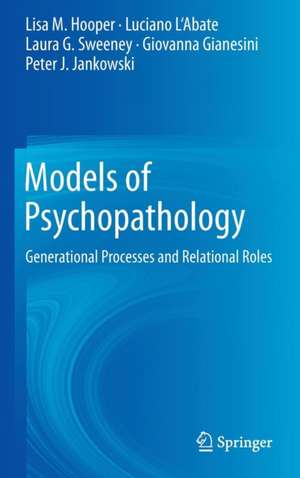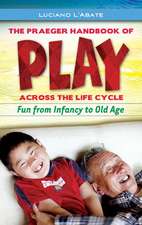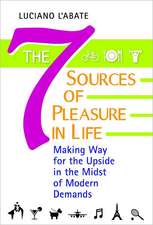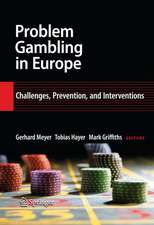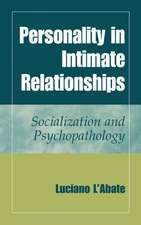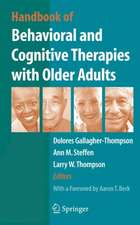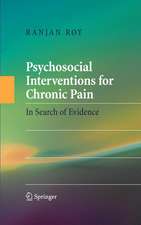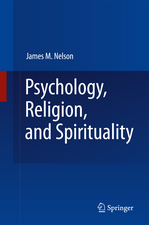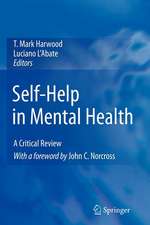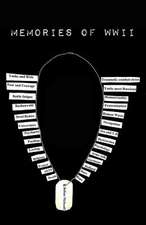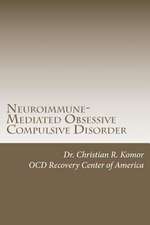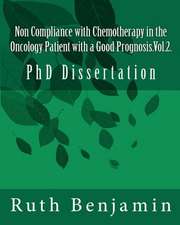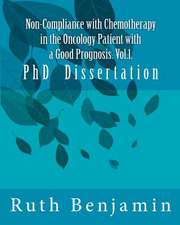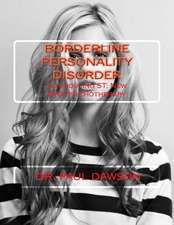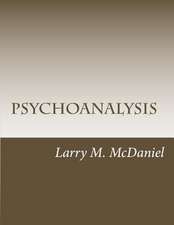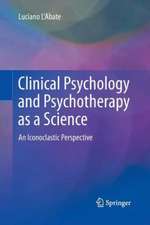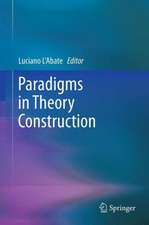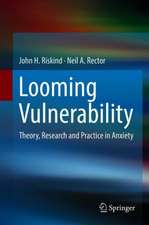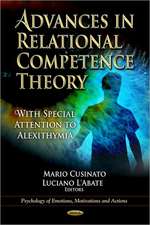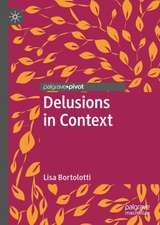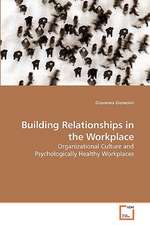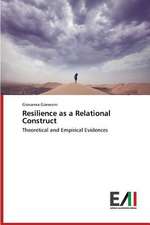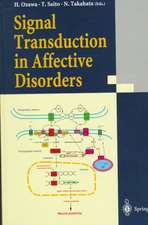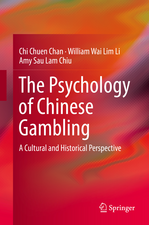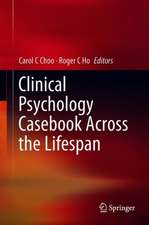Models of Psychopathology: Generational Processes and Relational Roles
Autor Lisa M. Hooper, Luciano L'Abate, Laura G. Sweeney, Giovanna Gianesini, Peter J. Jankowskien Limba Engleză Hardback – 12 oct 2013
| Toate formatele și edițiile | Preț | Express |
|---|---|---|
| Paperback (1) | 713.33 lei 43-57 zile | |
| Springer – 23 aug 2016 | 713.33 lei 43-57 zile | |
| Hardback (1) | 720.31 lei 43-57 zile | |
| Springer – 12 oct 2013 | 720.31 lei 43-57 zile |
Preț: 720.31 lei
Preț vechi: 758.23 lei
-5% Nou
Puncte Express: 1080
Preț estimativ în valută:
137.83€ • 144.29$ • 114.05£
137.83€ • 144.29$ • 114.05£
Carte tipărită la comandă
Livrare economică 07-21 aprilie
Preluare comenzi: 021 569.72.76
Specificații
ISBN-13: 9781461480808
ISBN-10: 1461480809
Pagini: 252
Ilustrații: XIV, 237 p. 7 illus.
Dimensiuni: 155 x 235 x 19 mm
Greutate: 0.53 kg
Ediția:2014
Editura: Springer
Colecția Springer
Locul publicării:New York, NY, United States
ISBN-10: 1461480809
Pagini: 252
Ilustrații: XIV, 237 p. 7 illus.
Dimensiuni: 155 x 235 x 19 mm
Greutate: 0.53 kg
Ediția:2014
Editura: Springer
Colecția Springer
Locul publicării:New York, NY, United States
Public țintă
ResearchCuprins
Introduction.- The Deadly Drama Triangle and Relational Competence Theory.- Parentification.- Parental Alienation Behaviors.- Bullying.- Stockholm Syndrome.- Psychopathology and Self-Regulation: Assessment, Case Conceptualization, and Intervention.- Conclusion.- Future of Relational Psychopathology.- Appendices
Recenzii
"In these latest books, Dr. L’Abate further advances his theory of using distance, remote writing on the Internet for preventive, promotional, para-therapeutic, therapeutic, and rehabilitative purposes. Dr. L’Abate believes that this approach can match most psychiatric disorders derived from common psychological tests and link interventions with matching evaluations in ways that cannot be achieved verbally from face-to-face meetings.
The new books will be available through Workbooks for Better Living (http://mentalhealthhelp.com/homepage/) either at the end of this year or next year. Dr. L’Abate founded the site in 1996 as a forum to offer low-cost interactive practice exercises administered by qualified mental health professionals.
“The workbooks consist of a series of assignments or homework assignments, interactive practice exercises comprised of questions or tasks to be utilized for educational, para-preventive, or para-therapeutic purposes,” said Dr. L’Abate. “Assignments can be administered through face-to-face interaction and delivered at a distance from participants through mail, fax, or computer. These workbooks can be used also as software for Computer-Assisted Interventions.”
Dr. L’Abate, a Professor Emeritus of Psychology at Georgia State University in Atlanta, founded the first Ph.D. program in Family Psychology and the first automated play therapy room in the world. He is a Diplomate and former Examiner of the American Board of Professional Psychology and Fellow and Approved Supervisor of the American Association for Marriage and Family Therapy. In 1994 he was awarded the title of "Family Psychologist of the Year" by the Division of Family Psychology of the American PsychologicalAssociation. Because of his original and highly creative theories on family relationships and his continuing work in this field of psychology, Dr. L'Abate, remains a much sought-after speaker by universities and professional organizations. In August of 2013, for example, he presented a paper on the slow decline and possible demise of the traditional family at the annual American Psychological Association convention.
Despite the acceptance of his groundbreaking approaches in Europe, Asia and elsewhere, this Italian-born scholar has often been ahead of his time in developing clinical approaches that have yet to gain widespread acceptance in the United States. “Until more clinicians in the United States validate my theoretical models or apply more of my clinical approaches with greater frequency, I will not consider my many lifetime achievements fully acknowledged in American psychology,” Dr. L'Abate said recently.
Dr. L'Abate would be pleased to discuss his work, why he believes his work has not gained acceptance in the United States, and what he thinks it will take for that to happen.
TO INTERVIEW DR. L'ABATE: To arrange an interview Dr. L'Abate either in person or by phone, please contact: Simonetta Esposito, Zoe Worldwide. Email: Simonetta(at)zoeworldwide(dot)com, (770) 906-6298."
Atlanta, GA (PRWEB) April 17, 2014
“The workbooks consist of a series of assignments or homework assignments, interactive practice exercises comprised of questions or tasks to be utilized for educational, para-preventive, or para-therapeutic purposes,” said Dr. L’Abate. “Assignments can be administered through face-to-face interaction and delivered at a distance from participants through mail, fax, or computer. These workbooks can be used also as software for Computer-Assisted Interventions.”
Dr. L’Abate, a Professor Emeritus of Psychology at Georgia State University in Atlanta, founded the first Ph.D. program in Family Psychology and the first automated play therapy room in the world. He is a Diplomate and former Examiner of the American Board of Professional Psychology and Fellow and Approved Supervisor of the American Association for Marriage and Family Therapy. In 1994 he was awarded the title of "Family Psychologist of the Year" by the Division of Family Psychology of the American PsychologicalAssociation. Because of his original and highly creative theories on family relationships and his continuing work in this field of psychology, Dr. L'Abate, remains a much sought-after speaker by universities and professional organizations. In August of 2013, for example, he presented a paper on the slow decline and possible demise of the traditional family at the annual American Psychological Association convention.
Despite the acceptance of his groundbreaking approaches in Europe, Asia and elsewhere, this Italian-born scholar has often been ahead of his time in developing clinical approaches that have yet to gain widespread acceptance in the United States. “Until more clinicians in the United States validate my theoretical models or apply more of my clinical approaches with greater frequency, I will not consider my many lifetime achievements fully acknowledged in American psychology,” Dr. L'Abate said recently.
Dr. L'Abate would be pleased to discuss his work, why he believes his work has not gained acceptance in the United States, and what he thinks it will take for that to happen.
TO INTERVIEW DR. L'ABATE: To arrange an interview Dr. L'Abate either in person or by phone, please contact: Simonetta Esposito, Zoe Worldwide. Email: Simonetta(at)zoeworldwide(dot)com, (770) 906-6298."
Atlanta, GA (PRWEB) April 17, 2014
Notă biografică
Lisa M. Hooper has published and has done research on the Parentification model, as one variations of the DDT (Hooper, 2007; Hooper at al., 2011a, 2011b).
Luciano L’Abate has been responsible for resuscitating the DDT and for seeing the other models as related and derived in many ways from this model.
Laura G. Sweeney has had a great deal of personal experience with the Parental Alienation Syndrome (PAS). She has published chapters on various paradigms and co-edited one book on Research on Writing Approaches in Mental Health with L’Abate (2011).
Giovanna Gainesini has published in the area of Bullying.
Peter Jankowski, is eminently qualified to write about the Stockholm Syndrome
Luciano L’Abate has been responsible for resuscitating the DDT and for seeing the other models as related and derived in many ways from this model.
Laura G. Sweeney has had a great deal of personal experience with the Parental Alienation Syndrome (PAS). She has published chapters on various paradigms and co-edited one book on Research on Writing Approaches in Mental Health with L’Abate (2011).
Giovanna Gainesini has published in the area of Bullying.
Peter Jankowski, is eminently qualified to write about the Stockholm Syndrome
Textul de pe ultima copertă
The family is the essential human relationship, offering love, support, and trust between partners, vital bonds between siblings, and the care and nurturing of children to ensure a healthy next generation. Ironically, this seminal unit can also be a blueprint for and deadly source of lifelong problems and dysfunctional solutions, with the potential for damage to future roles and relationships.
Models of Psychopathology probes familial roles and intimate relationships as vehicles for—often times but not always—emotional disturbance and damage to child and adult relationships. The four constructs examined here—parentification, parental alienation behavior, bullying, and Stockholm syndrome—are of great importance, frequently appearing in the clinical and empirical literature and news as subjects of heated controversy (especially in the case of parental alienation). A panel of experts, including Luciano L'Abate and Lisa M. Hooper, teams Relational Competence Theory and the deadly drama triangle with affiliated models to reveal key aspects of specific roles, relational, and generational patterns as they contribute to maladaptive and normative behaviors. Among the book's features:
Models of Psychopathology probes familial roles and intimate relationships as vehicles for—often times but not always—emotional disturbance and damage to child and adult relationships. The four constructs examined here—parentification, parental alienation behavior, bullying, and Stockholm syndrome—are of great importance, frequently appearing in the clinical and empirical literature and news as subjects of heated controversy (especially in the case of parental alienation). A panel of experts, including Luciano L'Abate and Lisa M. Hooper, teams Relational Competence Theory and the deadly drama triangle with affiliated models to reveal key aspects of specific roles, relational, and generational patterns as they contribute to maladaptive and normative behaviors. Among the book's features:
- A combined conceptual-theoretical approach for clearer understanding of key issues.
- Up-to-date chapters exploring parentification, parental alienation, bullying, and Stockholm syndrome.
- A continuum of outcomes, from normative to pathological.
- Therapeutic guidelines for working with clients whose families reflect the models.
- Implications for future research and practice.
- Workbook appendices offering tools for assessment and intervention.
Caracteristici
Focus will be on generational and relational processes rather than psychodynamic Models have been greatly expanded and validated independently of each other Models expand the concept of Relational Competence Theory
